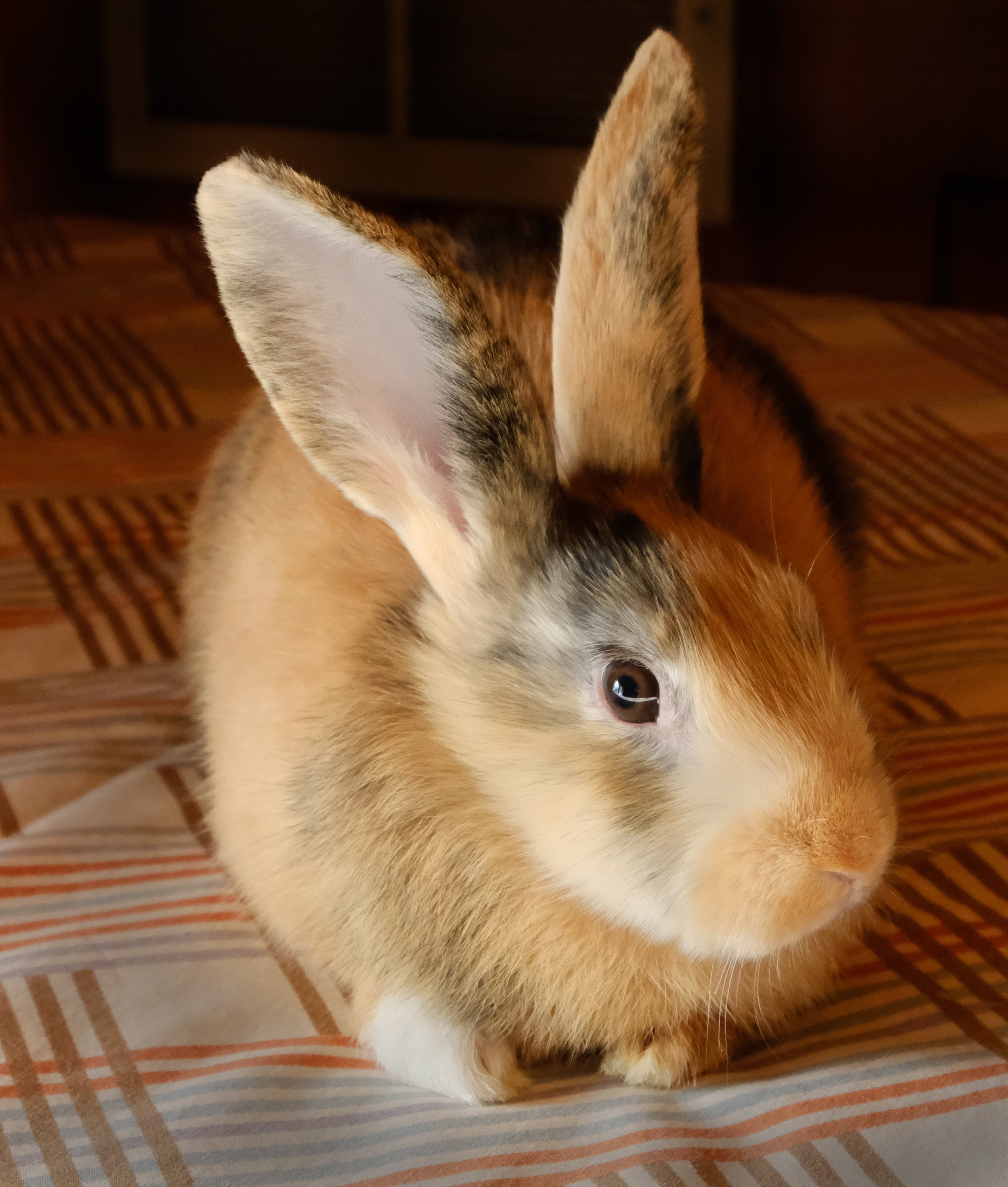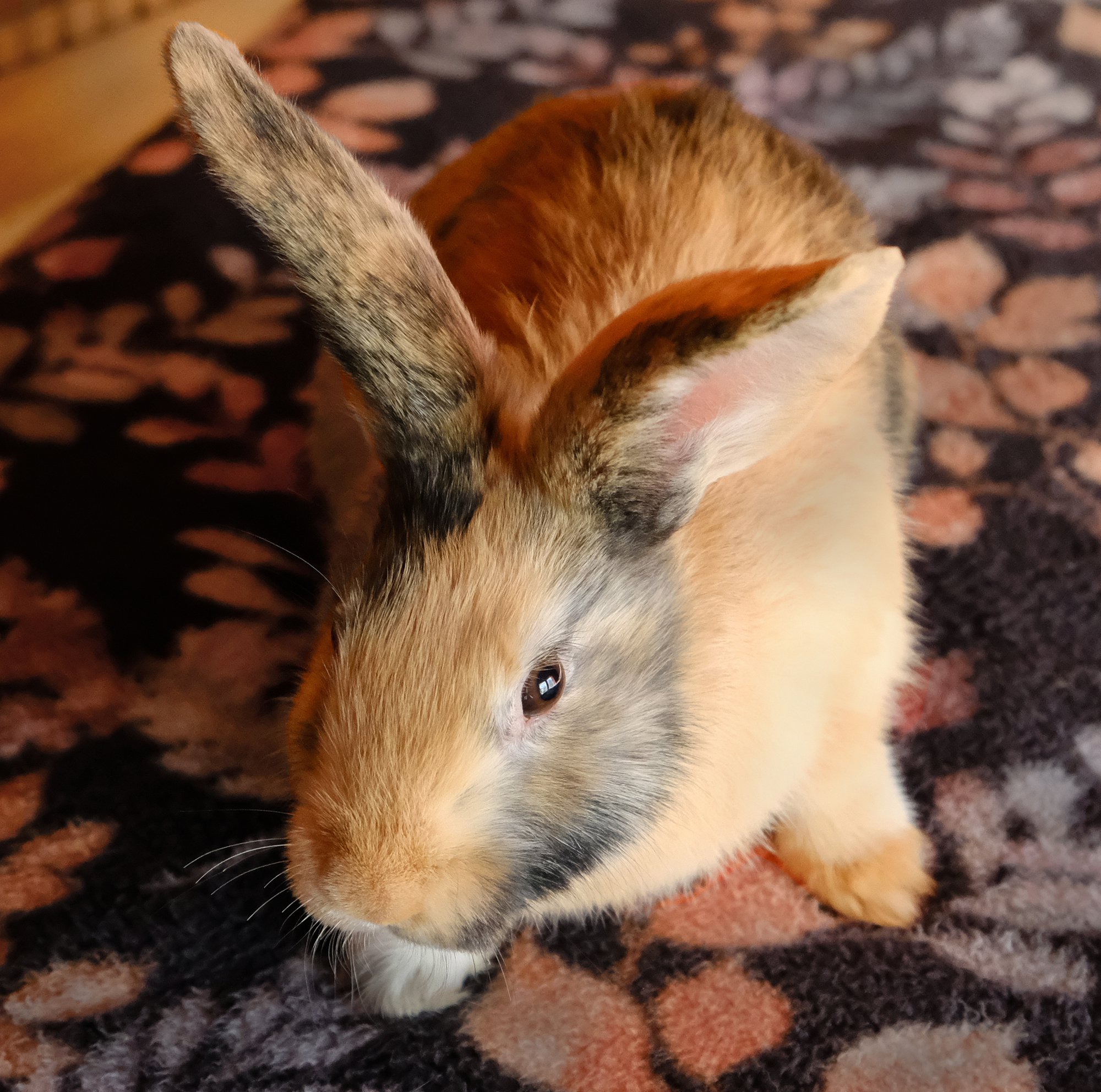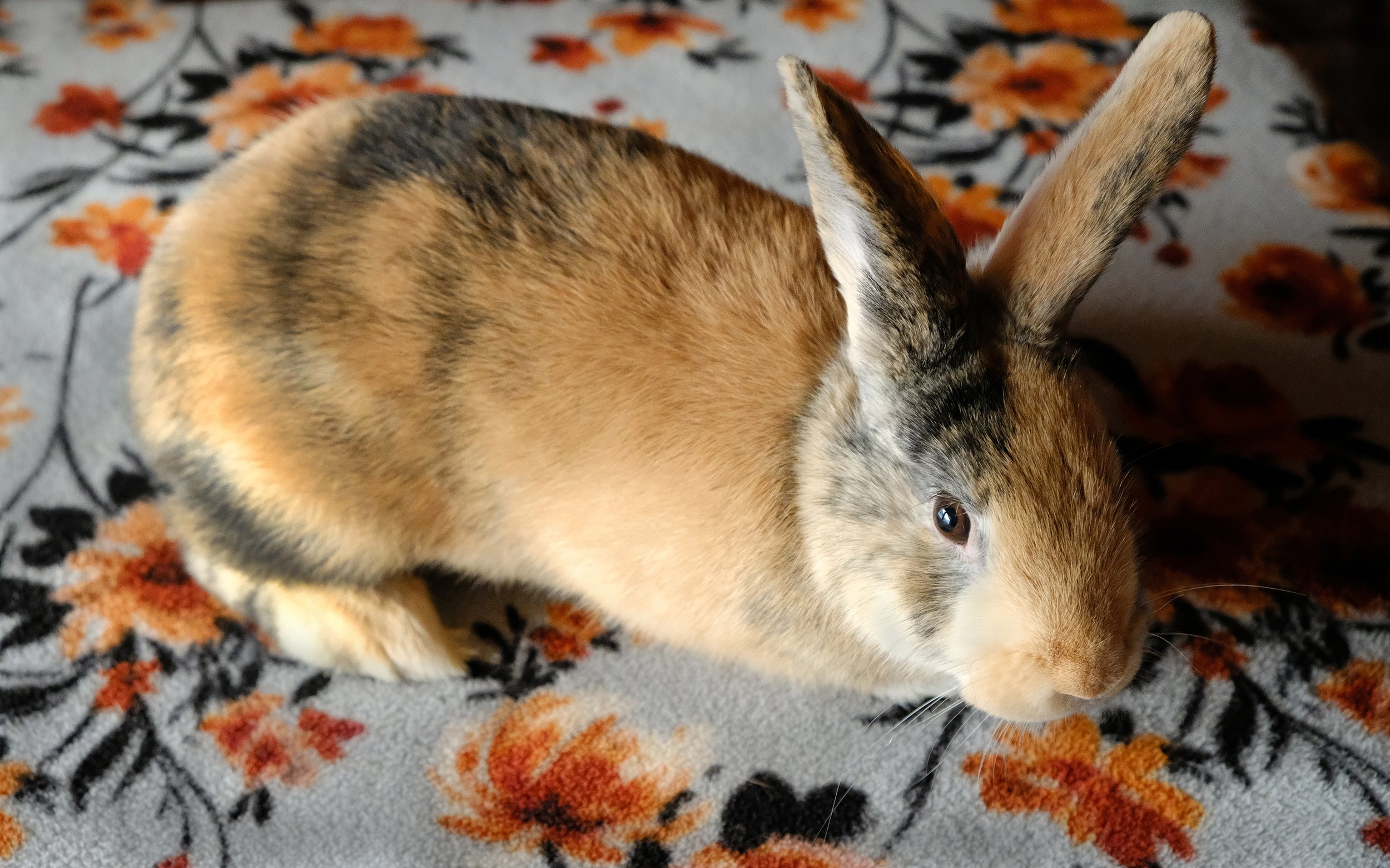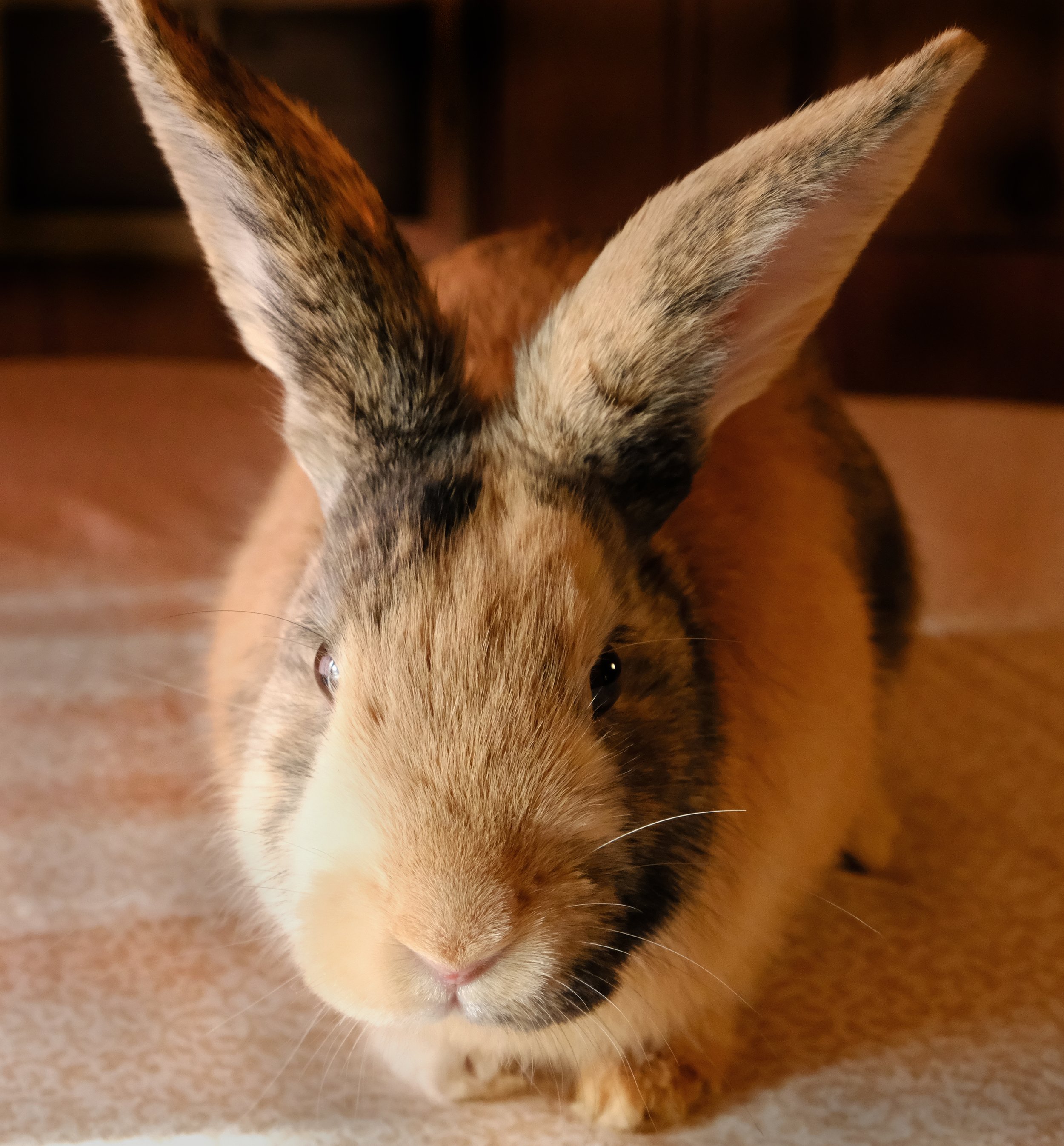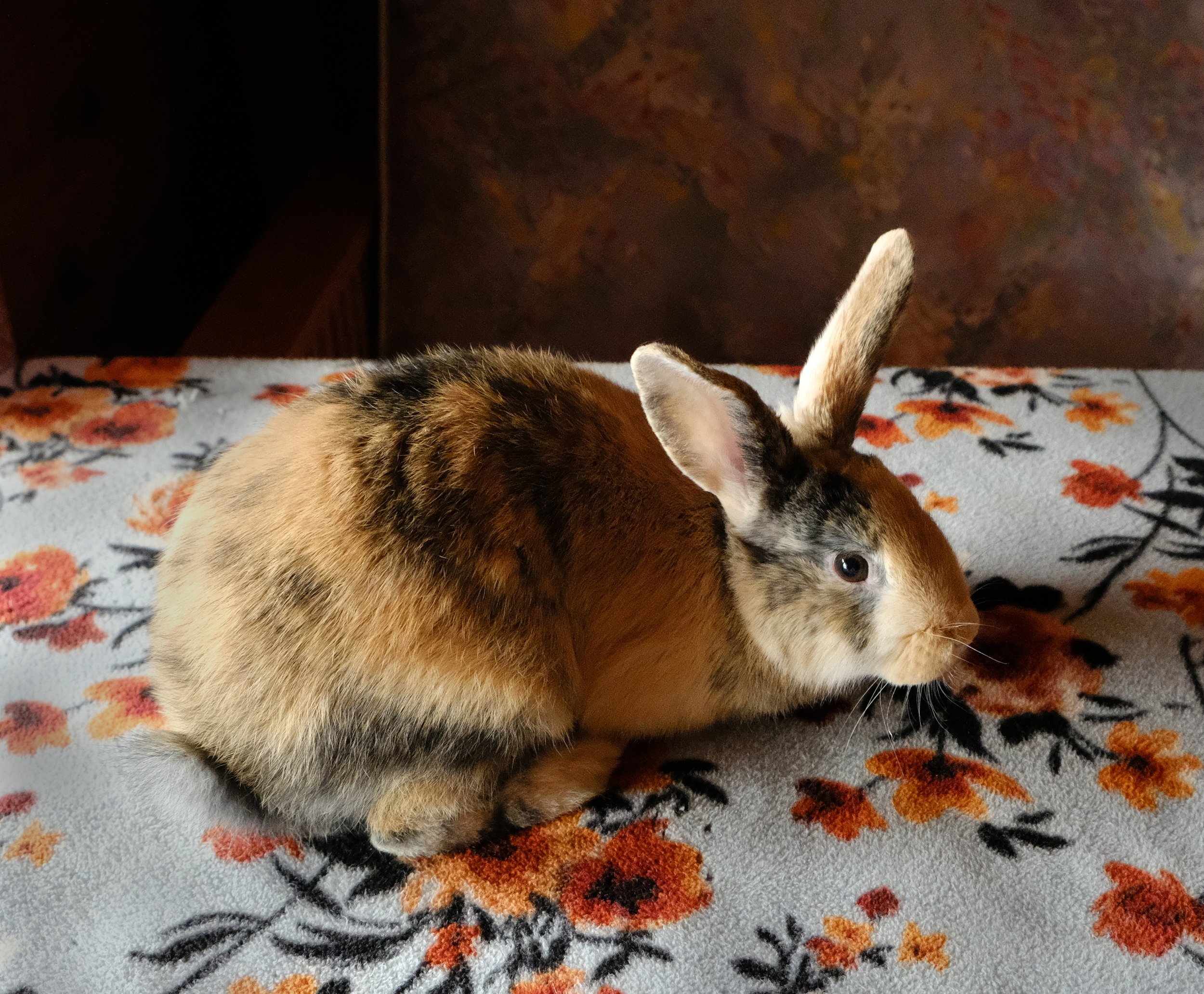On a chilly October day, four Harlequin rabbits were abandoned in a suburban Twin Cities park. When the creatures were rounded up, they welcomed their rescuers; once they had been someone’s pets. The Minnesota Companion Rabbit Society (MCRS) was contacted and picked up the quartet. They issued an urgent call for volunteers to foster the rabbits, and I responded.
My husband, Dan, and I had adopted a sweet Mini Rex named Charles through MCRS, and for years, supported this dedicated, mostly-volunteer group with donations. Now it was time for me to raise my hand and volunteer. My experience was with male rabbits, so I was assigned a scruffy, dun-colored fellow who I christened “Benny.”
Betty
Benny was initially cautious, but relieved to be in safe surroundings. He would sit on the couch with me, near his exercise pen carpeted with fleecy blankets and all the food, hay and water he could desire. One day, while rubbing his belly, I felt something unusual. First I thought it was scar tissue, perhaps from a fight while he was fending for himself outdoors. Looking closely, I realized it was a nipple – was Benny a girl? MCRS staff examined Benny, and confirmed the rabbit was indeed a female. The next question was whether Benny, now Betty, was pregnant, because two males were also in the group rescued from the park that day.
The veterinarian who examined Betty before she received her required Rabbit Hemorrhagic Disease vaccination did not think so, and she received her shot. Four days later, on the evening of November 2, 2021, Betty, agitated, with a wild look in her eye, circled around her enclosure, frantically pulling fur from her chest. Tufts were scattered everywhere. This was nest-making behavior, signaling she was about to give birth. I gathered up clumps of fur, tucking them into an improvised nesting box.
In the morning, Betty sat quietly beside the box, a bit confused. Within the folds of plush blankets, wiggling beneath clouds of fur were four miniscule, hairless baby bunnies. Betty had given birth.
Betty’s babies, two weeks old. Harry with pink nose, snoozing
In the following weeks, as I watched Betty care for her babies, I apologized profusely to her – How could we not know she was a female? Why hadn’t anyone figured out she was pregnant? She should’ve been given extra food and care. Betty was abandoned in a park when she was barely six months old, and pregnant. Her soulful brown eyes held many secrets.
Dory, Squib, Harry, and Zee
Now, I had one female rabbit and four babies, increasing the rabbit population in our household from our own Charles to a total of six! For the next several months, I barely stayed ahead of the learning curve, caring for this young rabbit family. But it was endlessly interesting and engaging.
At first, Betty did all the work, feeding them in the nest box once every evening, after dark. Rabbits are prey animals with instincts to protect their young from predators, so feeding in darkness keeps the babies safe.
During their second week of life, I began documenting the babies, producing photographs and video clips assembled into short movies that I posted on Vimeo. (Later, MCRS would use these images on Petfinder to entice potential adopters.) I watched their splotchy, hairless, wiggly bodies develop fur, their eyes slowly open, and their ears stand up. They became more coordinated, scrambling around the nest box and over each other, depositing tiny poops.
One honey-colored bunny was often discovered in the farthest corner, under the folds of blankets. I named this bunny “Dora” after Dora, the Explorer, the children’s cartoon character. The tiniest, scrappiest rabbit of the four, I dubbed “Squib,” who ironically went on to develop a healthy appetite and became the most robust. Later, this cuddly bunny with the bowling-ball-belly was the first to be adopted, and renamed “Leon.”
I managed to contain the babies in the nest box for several weeks, but one bunny was insistent about climbing out to find Betty. I named him “Harry” after the escape artist, Harry Houdini. I observed Harry the first time he made it out to discover Betty lounging nearby. It was mid-afternoon and he nuzzled her, seeking dinner. She brushed him aside. He tried again, no success. And then he went face-to-face with Betty and began grooming her, and snuggled up right next to her. Harry had Betty to himself for several days before the others found their way out of the nest box. He became Betty’s sidekick.
At three weeks, the bunnies were able to be sexed. Up to this point, they were little baby fur balls – now I found out all four were boys! Dora was renamed “Dory.” But one bunny didn’t have a name yet; a pensive fellow who completely relaxed when I picked him up, even chattering his teeth (a sign of purring). Finally, I decided to call him Zee, the last letter of the alphabet. Now all four boys had names.
Harry, Like a Meteor
The life of every sentient being is unique and particular. Rabbits are subtle in their communication with us. We must be present in the moment and allow them to give themselves to us in the way they are able – by instinct, biology, and personality.
The Harlequin boys had body types, markings, and behaviors so different from each other, and their personalities continued to develop. Harry grew to be an affectionate, entertaining and charismatic rabbit, like our resident rabbit, Charles. He soon became my favorite because he worked at it.
In the morning, Harry would greet me, standing very tall in his exercise-pen, stretching up toward me, presenting his belly to be rubbed, inviting me to pick him up. I also perceived he was using this maneuver to calculate the height of his enclosure; how he could make it over the top. One morning, as I walked past, in a flash he launched right up, and into my arms. It happened so fast, and he was so accurate in his calculations, he looked up at me with an expression of surprise and delight.
Harry had endearing, and odd, habits. He placed both paws in the water bowl when he drank from it, and also in the food bowl, like he was claiming his space. But he was kind to his brothers, sharing salad and treats, grooming and snuggling them. He continued to hover at Betty’s side.
Betty, Harry, Dory, Squib and Zee (drinking water)
When MCRS posted him on Petfinder, many thought he was named after Harry Potter, and I didn’t contradict this perception. He was soon selected by a young woman who took MCRS up on the option for foster-to-adopt. So many rabbits have been surrendered, or abandoned like Betty and her group of Harlequins, during the coronavirus pandemic that there was not only a critical need for fosters like me, but also for additional options for adoption.
Harry left our house on February 10, 2022, after three-and-a-half months. I was sad, but trusted he would charm his way into his forever home and continue to lead a joy-filled life with others who cherished him. I looked forward to seeing him bounding around the room with Charles, Betty, his brothers, and rabbits at the Hoppy Hour events that MCRS sponsors. It was not to be.
While making the difficult decision to euthanize Buster, our first rabbit, who had lived for thirteen years and was rapidly declining, our veterinarian gave us the wise advice to write down all the habits, quirks and endearing traits that would keep him alive in our memory. This was the first time I had been faced with the heartbreaking choice to end another being’s life. Buster’s will to live was strong, but his body was giving out. We chose the date and time to end his life. When our second rabbit, Eddie, suddenly became very ill at nine years of age and was clearly in pain, the decision was no easier.
Harry was vibrant and young. No one chose the time and date for his death. He passed unexpectedly, during a common neutering surgery. Rabbits are often sensitive to anesthesia, and he did not wake up. He was just four months old. I am heartbroken that Harry is no longer in this world and this post is my tribute to him, honoring his spirit, and his brief but vivid life.
On April 9, 2022, Betty found her forever home. She had a “date” at a MCRS adoption event with handsome Pugsly, a shy fellow who had recently lost his bond-mate. Like Betty, Pugsly was rescued after living outdoors. During the date, Pugsly cowered in a corner, not sure what to do. Betty came over and quietly sat beside him. Later, they touched noses. Clearly they made a connection. Now, Betty is embarked upon a happy life with her new friend Pugsly and a loving and patient owner (bonding rabbits requires tenacity and patience.)
Zee and his forever family found each other on April 30, 2022. A loving Mom and her her sweet little boy adopted him. He’s now a happy free-roaming bunny enjoying playtime and hugs with a human more around his size.
Honey-colored Dory found his forever home on May 7, 2022 with a young woman who fell in love with his photo and story on Petfinder. This was Dory’s first appointment with a prospective adopter (Zee met with three different potential adopters before he was chosen) and Dory, although apprehensive, endeared himself. He’s now named Disco because of his energy and goofiness as he free-roams his new home.
Some day in the future, I hope that Betty, Leon (Squib), Zee, and Disco (Dory) can have a family reunion at one of the MCRS Hoppy Hours. Meantime, my house is quiet without Betty and her boys, and our resident rabbit, Charles, now has all my attention.
UPDATE: Sadly, on November 3, 2023 we had to put Charles to sleep. He was our beloved resident rabbit for ten years. He won our hearts - and I would often say that he chose us - one day when we stopped in to Petco to pick up food for our other resident rabbit, Eddie. Charles stood up on his hind legs and greeted us from the kiosk where the Minnesota Companion Rabbit Society displayed rabbits available for adoption. (Now, adoptable rabbits are fostered in homes by volunteers like me.) He was such a friendly and joyful rabbit, we couldn’t resist and brought him home. We are missing his presence.







